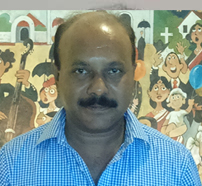
Blog by Savita Narayan, Fiction Editor
6 April 2021- Doctrine of Lapse Indian Queens who Fought it
Pofiles of some queens who fought the Doctrine of Lapse with all they had. This is a very small sample. The policy Doctrine of Lapse was unjust and they, in principle, saw no need to give up without a fight. Some won the immediate battle, some lost their lives. But all had their states annexed by the British in the end.
To read about Doctrine of Lapse Indian Queens who Fought it, please visit Savita's Page
3 April 2021 Courtesans and Common Folk that fought the British in 1857
Some profiles that make us pause are - Motibai who was a canon-feeder in the army of Lakshmibai of Jhansi. She was martyred on 4 June 1858 on the battlefield. Mundarbai was security-in-charge of the Rani. She fought alongside her in several battles with British and their allies.
To read about Courtesans and Common Folk that fought the British in 1857, please visit Savita's Page
2 April 2021 - Bhaumakara Queens of Odisha
Tribhuvanamahadevi ascended the throne under rather unusual circumstances. After the death of her husband Shantikaradeva I, their son Shubhakaradeva III became the ruler. However he died soon after. The next in line was his young son Subhakaradeva II, considered too young to rule. Thus his grandmother Tribhuvanamahadevi (r 846-850 CE) took over the reigns of the kingdom. She ruled in her own right, not as a regent for her grandson
To read more about the Bhaumakara Queens of Odisha, Please visit Savita's Page
1 April 2021 - Ahilyabai Holkar, The much-remembered beloved queen of Malwa
Ahilyabai (1725 - 1795 CE) is a rare female ruler in the 18th century remembered today for her excellent governance. Her state was considered the best governed state in India of her time. She ascended the Holkar throne in Malwa by sheer circumstance. Ahilyabai’s husband Khanderao Holkar was killed in the battle of Kumher, Rajasthan in 1754.
To read more about Ahilyabai Holkar, please visit Savita's Page
13 February 2021 - Aatukuri Molla - People's Favourite Ramayana in Telugu
Molla is considered among the greatest poets in Telugu literature although only one work of hers, Ramayanam, is known to us. Until a few decades back it was studied as a text book by school children who learnt it by heart.
To read more about Aatukuri Molla, please visit Savita's page
9 Februrary, Velu Nachiyar - The queen who fought for freedom from the British
Resistance in India to foreign rule Velu Nachiyar (1730-1796) the third ruler and queen of Sivaganga was among the early royalty to put up...
To read more about Saalamarada Thimmakka, please visit Savita's page
27 January 2021, Perin Naoroji Captain - A Life Dedicated to India's Freedom
Perin Naoroji Captain was the granddaughter of the scholar-politician Dadabhai Naoroji, the Grand Old Man of India. He was one of the founders of the Indian National Congress, and thrice its president. Naoroji was a British MP as a member of the House of Commons.
To read more about Saalamarada Thimmakka, please visit Savita's page.
31 December 2020, Saalamarada Thimmakka - The Power of One
Thimmakka is known today for the nearly 400 Saalamara, Banyan Tree in Kannada, that she planted for a length of 4-5 kilometers from her village Hulikal to Kudur in Karnataka. But that is not all. Thimmakka has planted about 8,000 trees in over 80 years.
To read more about Saalamarada Thimmakka, please visit Savita's page.
10 December 2020, Matangini Hazra - Freedom's Champion
Matangini Hazra (1870-1942) was born in the village Hogla in Tamluk, Midnapore district, Bengal in the family of a poor farmer. Child marriage was prevalent at the time and Matangini was married as a young child to a rich widower Trilochan Hazra, who was 62 years old at the time. She did not receive an education...
To read more about Matangini Hazra, please visit Savita's page.
29 November, 2020, Durgabai Kamat - The first actress of Indian film
When I came across the name of Durgabai Kamat, I was intrigued. How much of a risk-taker she must have been to be willing to participate in an absolutely new venture such as film making! I read all the available literature on her and her times, it appears she only worked in one film. Her milieu was the stage. Durgabai’s daughter Kamalabai, however, acted in about 35 films in her career, right up to Gehrayee (1980)...
To read more about Durgabai Kamat, please visit Savita's page.
28 February, 2020, Chandravati Ramayana - The Feminine Perspective
Chandrabati / Chandravati was a medieval poet, born around 1550 CE in Kishoreganj, Maimansingh now in Bangladesh. She is considered the first woman poet in her mother-tongue Bangla. Her legacy continues to be preserved, not just as academic interest, but woven into the fabric of women’s lives in rural Bengal even today through her verses...
To read more about Chandravati Ramayana, please visit Savita's page.
28 January, 2020, KB Sundarambal - When life gave her lemons, she made lemonade
This is the story of a woman, a singer, who is a living memory for many of the older generations in South India. Sundarambal’s life and career coincided with several crosscurrents in twentieth century India - the arrival of an increased number of gramophone companies from Europe into the country in search of new voices, the introduction of cinema and its slowly increasing popularity and the escalation in political activity in India because of the freedom struggle...
To read more about KB Sundarambal, please visit Savita's page.
25 January, 2020, Bahinabai - The Traditional Non-Conformist
Bahinabai’s life (1628-1700 CE) and the events in it are known to us today because of her unusual practice of noting them all down precisely in her verses, in seventy-eight abhangas with her exact date of birth. She also wrote her autobiography Atmamanivedana...
To read more about Bahinabai, please visit Savita's page.
23 January, 2020, Avantisundari - Princess of Intellect
Avantisundari was an exceptionally accomplished woman who lived in the 9th and 10th century CE in the kingdom of the Gurjara-Pratihara, a dynasty which ruled over an extensive area in North India extending upto the Narmada in Central India. Her husband Rajasekhara, court poet and grammarian, writes of her as ‘a jewel of a Chahamana or Chauhan family’ which means she was a princess in the opinion of Sanskrit scholar and musicologist V Raghavan. The couple entered into anuloma, an intercaste marriage. The practice was accepted by society at the time...
To read more about Avantisundari, please visit Savita's page.
3 July, 2019, Abbakka Chowta: The Relentless Warrior-Queen
In the 1500s, after reports of Vasco da Gama’s voyage to India reached home, European powers first came to India to trade for spices. Over the next few centuries they then were granted trading rights by some rulers, fought with some other local rulers to keep and expand their trading rights and finally asserted political power. This progression of traders to rulers saw many Indian rulers refusing to accept foreign suzerainty and fighting to keep their autonomy...
To read more about Abbakka, please visit Savita's page.
12 June, 2019, Naikadevi - She Stood Like a Rock for her People
The saga of Naikadevi’s regency (1175-1178 CE) during the rule of the Chalukya in Gujarat is one about her cool thinking, unfazed bravery and of not being taken in by the reputation of the enemy. The adversaries - Naikadevi and Mohammad Ghori of Ghor in Afghanistan - were equally determined to achieve their goals. Naikadevi was defending her kingdom, Ghori was bent on conquering it and had come all the way to Gujarat in the hopes of adding to his realm. However, the result of their encounter was a drubbing Ghori could not stomach...
To read more about Naikadevi, please visit Savita's page.
31 May, 2019, Rudramadevi - A Queen True to Her Calling
Rudramadevi (reign 1260 - 1290 CE) of the powerful Kakatiya dynasty ruled from her capital Orugallu, present day Warangal in Telangana. The area was naturally rich in diamonds and was throughout the target of several attacks and invasions by vying rival kings seeking to expand their territories...
To read more about Rudramadevi, please visit Savita's page.
12 March, 2019 - Naganika - The Empress Who Wrote In Stone
Queen Naganika (also referred to as Nayanika) was of the mighty Satavahana empire, one of the biggest kingdoms in Indian history - you probably have faint recollections of reading about the dynasty in History class at school. Unless you are a Indian history or archaeology afficionado, the name may not ring a bell. But at one time, in the 2nd century BC, theirs was one of the pre-eminent empires of the Indian mainland...
To read more about Naganika, please visit Savita's page.
19 February 2019 - Vaidarbhi style of Sanskrit poetry
This is a small note on the Vaidarbhi style of Sanskrit poetry used by poets such as the queen-poet Gangadevi, the very eminent poet Kalidasa and many others. I thought it would be interesting to sketch a very basic idea of what exactly this style of poetry was all about.
To read more about this topic and other stories, please visit Savita's page.
16 Feb, 2019, Ganga Devi - The Poet Queen.
Gangadevi is the author of Madhura Vijaya (also named Virakamparaya Charita). She was the queen of Kumara Kampana Raya of Vijayanagara who conquered Madurai in 1371 and represented the empire at Kanchipuram. It is speculated that the poem was composed approximately between 1375 and 1400 CE.
To read more about Ganga Devi, please visit Savita's page.
8 Feb, 2019 Why Historical Fiction
Most people first encounter History at school. And if your school days were anything like mine, History was the one subject the class hated. The lessons were just a litany of names, dates and wars. There was no concept of linking events, of discussing ideas that culminated in events we were learning about, no talk of the impact of events, no whys or wherefores or therefores. History was just a part of the curriculum that had to be studied to pass exams. Dry as dust.
For the full blog, please visit Savita's page.
Our Blogs!!
Do read our Editors' Blogs!
- Shashi Blogs and speaks on various literary and tech issues.
- Savita Blogs on Women in Ancient India with a focus on writers and rulers.
- Chaitali Blogs and speaks on poetry.
Managing Editor Speaks:
 Shashi Kadapa.
Shashi Kadapa.
"We want to see passion in your work. I mean not 'ooh-ah', but real feelings, and thoughts..".
 Our Editors
Our Editors
We have Savita, the fiction editor and Chaitali, the poetry editor, sharp-shooting who like good work and watch hawk-eyed for any mistakes.
"Events" Happenings:
 NaNoWrimo
NaNoWrimo
Visit NaNoWrimo to see the latest events..
.